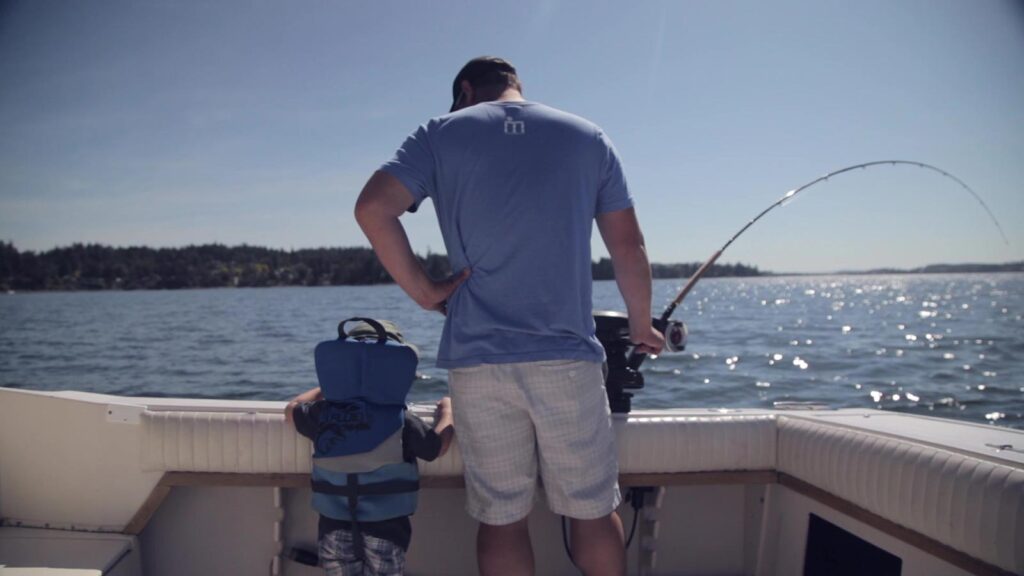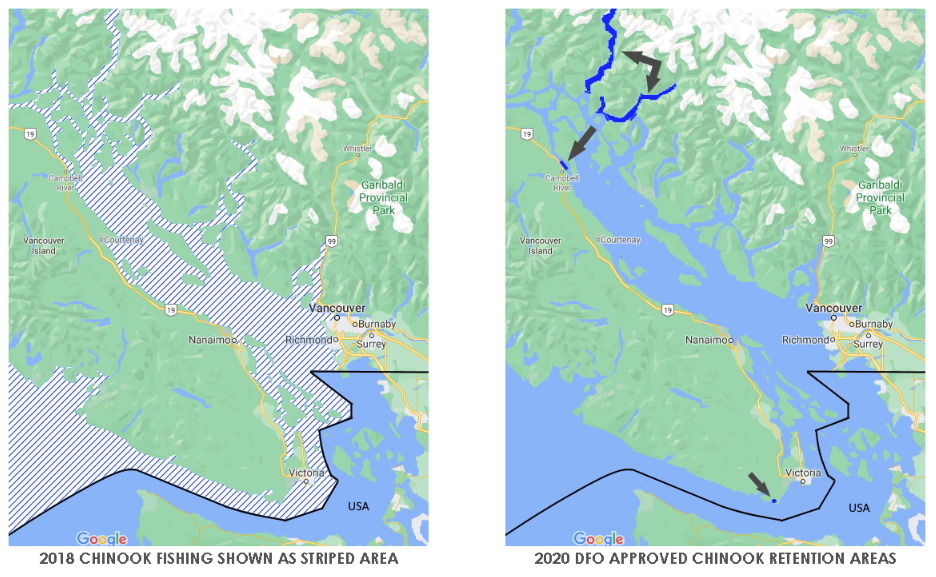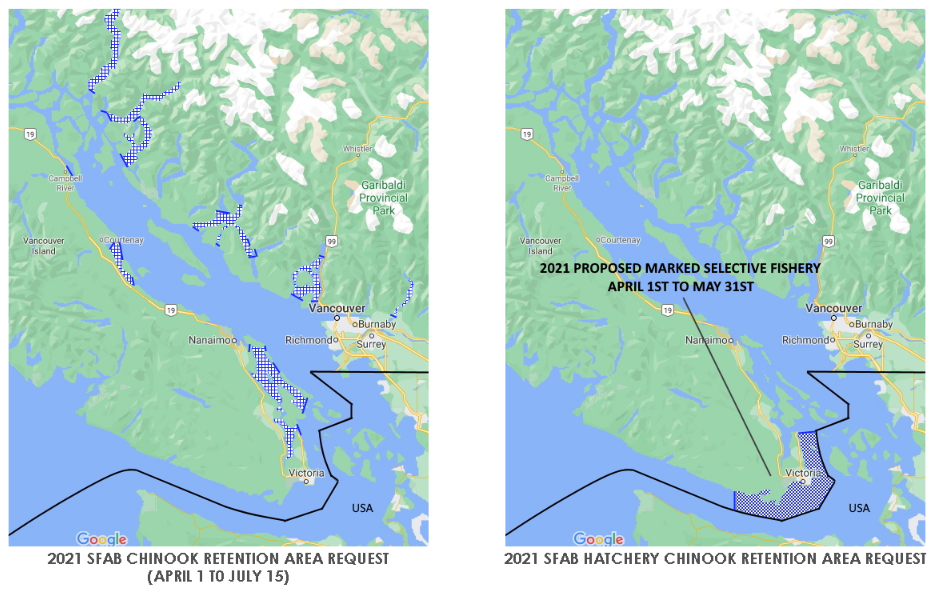
Based on the May 14th decision to again reject the very modest SFAB Chinook retention fishing proposal, Minister of Fisheries Bernadette Jordan is overseeing the dismantling of the Public Salmon Fishery in BC. Now, for a third straight year, much of Southern BC is locked into non retention of Chinook salmon from April through July. Continuation of the regimen will lead to the demise of the fishery. The following factual description explains the circumstances surrounding the decision and its consequences:
Background
- The Sport Fishing Advisory Board (SFAB) spent the last two years developing data supported fishing plans. If approved, these would allow for very limited and pre-cautionary Chinook retention angling in some specific areas, and at specific times, in Georgia and Juan de Fuca Straits, and the Mainland Inlets. These areas were put under Chinook-non-retention during the peak spring and early summer fishing period in 2019.
- This substantial body of work was done in conjunction with the Department of Fisheries and Oceans Pacific Region staff (DFO). It was compiled as a consequence of the 2019 heavy handed decision of then Minister of Fisheries, Johnathan Wilkinson. His decision prevented anglers from keeping Chinook from April 1st to as late as the end of July in order to protect weak spring and summer runs of Upper Fraser River Chinook.
- Minister Wilkinson stated that “these runs would not be lost on his watch”. The PFA supports the conservation goal, but not the department’s scorched earth policy applied to achieve it. This policy led to sweeping regulations that removed potential Chinook retention opportunities when these stocks of concern were not present; or were present in such small numbers that keeping other abundant Chinook stocks was not only possible but safe, according to DFO’s own stock composition and run timing data.
- In November 2019 Wilkinson was re-assigned as Minister of the Environment and Bernadette Jordan, from Nova Scotia, was appointed Minister of Fisheries.
- In early 2020 the SFAB developed fishing plans jointly with the DFO Pacific Region stock assessment staff. These plans were designed to avoid Upper Fraser River Chinook stocks of concern while allowing anglers to keep Chinook in areas where no impacts or extremely minimal impacts on these stocks would occur.
- The Minister rejected almost all of these proposals and in fact increased their severity, leading to a second year of crippling economic consequences for public fishery related businesses, and lost angling opportunities for retaining Chinook from abundant stocks.
- For the 2021 angling season the SFAB once again re-submitted fishing plans based on the same criteria but with even finer degrees of resolution.
- Pacific Region DFO staff undertook a thorough review of the SFAB proposal and graded each plan based on risk to stocks of concern. DFO’s own data-supported evaluation framework results showed the proposed fisheries were either no risk or low risk.
- In support of the SFAB proposal, 25 of 42 BC Federal government members of Parliament, which included all party representation except the Liberals. The Provincial Government also gave their support as well.
- Despite the broad support and viable data-supported fishery proposals, Minister Jordan rejected these plans. She did provide meager scraps of opportunity in the mainland inlets. However, her confusing announcement seemed to suggest that fishing opportunities that were approved later in 2020 were somehow new opportunities for 2021. This tactic of providing fishing opportunities that already existed is troubling. Her decision, for as yet unexplained reasons, ran counter to DFO Pacific Region’s thorough assessment.
- The Public Fishery requires stability for planning purposes and certainty of access. This decision could have been made months earlier as there was no new data that would have altered the proposals. Yet the Minister chose to delay the announcement for six weeks after the proposed fisheries start date. The PFA can only conclude this was to provide time to develop an excuse for not approving data supported angling opportunities. On its own, this demonstrates the indifference Minister Jordan shows for the most important and economically successful salmon fishery in BC.
- The PFA has no doubt this decision was based completely on politics and was driven by heavy pressure from First Nations and ENGO groups, like the Marine Conservation Caucus, who lobbied the Minister to oppose the Public Fishery proposals regardless of the Department’s own evaluations.
The PFA believes that data, not the political winds of the day, should be the most important factor in determining fisheries management policies. This position is supported by a Government of Canada document titled “A Framework for the Application of Precaution in Science-based Decision Making about Risk’-National Library of Canada.
“While societal values and public willingness to accept risk are key in determining the level of protection, in all cases sound scientific evidence is a fundamental prerequisite to applying the precautionary approach”.
In determining what constitutes a sufficiently sound and credible scientific basis, the emphasis should be on providing a sound and credible case that a risk of serious or irreversible harm exists”.
The Law of Unintended Consequences
- Some have described The Ministers May 14th announcement of Chinook fishing regulations as disappointing. This is an understatement. They are a disaster with compounding impacts from two previously crippling angling seasons, creating economic losses for coastal communities, while forcing hard working business owners to the brink. A third year of the same will push some over the edge. Sadly, this was totally unnecessary had modest data defensible Chinook retention been allowed.
- It sends a message that BC is no longer a world class destination for salmon angling. Recovery when it does begin will take time, in the interim the impacts on businesses that support fishing activities will continue.
- It exacerbates an already dismal tourism industry because of the COVID 19 international travel restrictions.
- Angler supported funding for salmon enhancement and restoration, a hallmark of anglers’ commitment to BC’s iconic salmon resources, is drying up.
- Anglers and angling groups are openly considering whether it makes sense to continue volunteering for salmon recovery projects.
- It breaks the continuity of the family fishing experiences where parents pass down their connection to fishing from one generation to the next.
- It has shaken the trust relationship between angling advisors and the federal government, leading to questions about the commitment of the Federal government to recreational angling, not only in BC but across Canada.
- Lack of trust leads to troubling questions. Is recreational fishing a pawn in a much larger political game? Can the federal government be trusted to negotiate fishing plans in good faith with anglers, and will they represent angling interests in other regional, national and international arenas fairly?
- Given the performance of this Minister in 2020 and now in 2021, her actions more closely resemble “intended consequences”; or they reflect an indifference or abysmal lack of knowledge about BC’s marine and in-river public fisheries.
How did we get here?
- After the signing of the 1985 Pacific Salmon Treaty salmon escapements began to improve generally. This trend continued into the late 1990’s.
- Under the Harper government’s austerity program funding for key fisheries related activities including research, stream restoration and enhancement began to decline.
- The once strong Recreational Fishery Division’s importance within DFO was severely weakened.
- Support and adequate funding for the Salmonid Enhancement Program, established in the 1970s by previous Fisheries Minister Romeo LeBlanc’s, began to wane as the focus shifted to recovery driven by a “wild salmon” ethos.
- By the 2000’s hatcheries closed, facility upgrades were not undertaken, and scheduled construction of new facilities was cancelled.
- Senior fisheries leadership moved away from a “can do” philosophy.
- The Department of Fisheries and Oceans, at the senior Department and political levels, has been woefully inept at protecting the salmon resource from man induced impacts in spite of the strengths provided by the Fisheries Act.
- Climate change is further complicating salmon recovery. Until very recently, DFO has not even considered adaptive measures to allow for and compensate for the threats posed to wild salmon by the steady change in climate conditions.
- Fishery restrictions have been the primary tools for addressing weak salmon stock recovery for decades. It has not worked. The harvest rates on some stocks of concern are so low they fall within the statistical margin of error, without producing any meaningful results.
- DFO seems averse to adopting new technologies in fish production and fish harvesting, like selective fishing and mass marking, that have been tested and proven effective in adjacent US fishing jurisdictions. DFO has instead opted for more studies.
In light of the factual details listed above, it is apparent our unique and valued Pacific salmon fishery is being dismantled. The PFA believes that it is time for an immediate wholesale review of the operation of DFO starting at the top that will produce a modern, forward thinking and responsive Department of Fisheries.
A Call to Action. The PFA, with the support of BC federal MP’s and the Province of BC, is committed to doing everything possible to reverse the damages done by an indifferent and in-effective Minister and senior Department of Fisheries and Oceans staff. The PFA is committed to fighting on behalf of the Public Fishery for common sense fisheries management and policies, and forward thinking within DFO that will protect weak salmon runs and sustain fisheries at a modest level through these difficult times. The PFA is putting its resources to work to bring long overdue changes to the way DFO operates. We call on anglers and citizens in BC and across Canada to join with us to stop the dismantling of the west coast’s Public Salmon Fishery before it is too late.
Support the PFA by donating to the cause and becoming a member:
You can do so here – https://publicfisheryalliance.ca/support-the-pfa/
Note: Small additional opportunities were approved for area 16
– 30 –
Detailed Background Information Including Maps:
https://publicfisheryalliance.ca/chinook2021


Yours truly,

Christopher Bos
Media Contact
778-967-2363
Public Fishery Alliance is a broad-based organization, representing the interests of BC Anglers.
